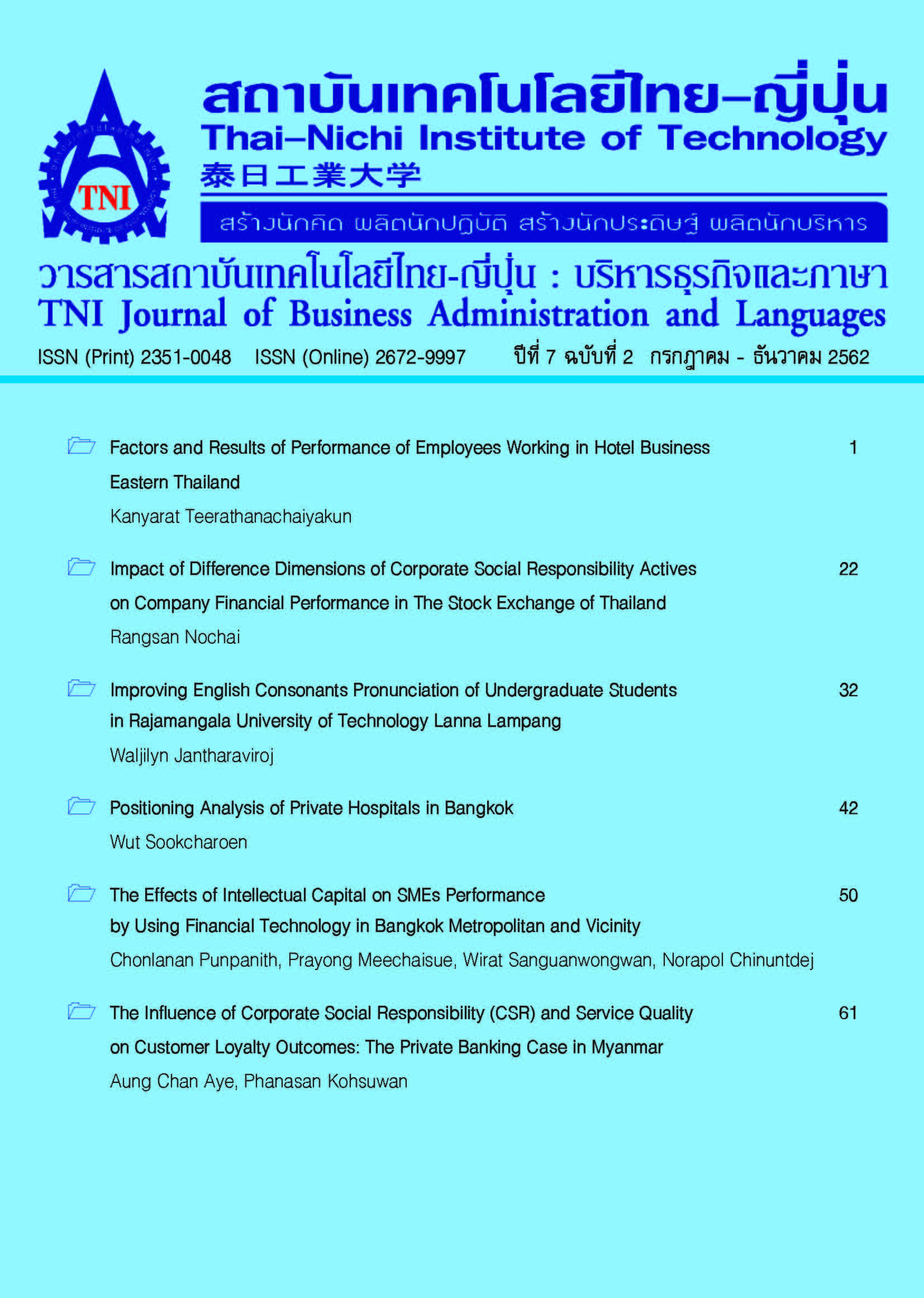ปัจจัยเหตุและผลของผลการปฏิบัติงานของพนักงานที่ปฏิบัติงานในธุรกิจโรงแรม เขตภาคตะวันออกของประเทศไทย
Main Article Content
บทคัดย่อ
การวิจัยครั้งนี้มีวัตถุประสงค์เพื่อศึกษาปัจจัยเหตุและผลของผลการปฏิบัติงานของพนักงานที่ปฏิบัติงานในธุรกิจโรงแรม เขตภาคตะวันออกของประเทศไทย เพื่อศึกษาอิทธิพลของผลการปฏิบัติงานของพนักงานที่ปฏิบัติงานในธุรกิจโรงแรม เขตภาคตะวันออกของประเทศไทย และเพื่อพัฒนาแบบจำลองปัจจัยเหตุและผลของผลการปฏิบัติงานของพนักงานที่ปฏิบัติงานในธุรกิจโรงแรมเขตภาคตะวันออกของประเทศไทย ผู้วิจัยกำหนดกลุ่มตัวอย่างในการศึกษาวิจัยครั้งนี้ คือ พนักงานระดับหัวหน้าขึ้นไป ที่ปฏิบัติงานในธุรกิจโรงแรม เขตภาคตะวันออกของประเทศไทย จำนวน 340 คน ซึ่งในการวิจัยครั้งนี้ ผู้วิจัยได้ทำการวิเคราะห์ข้อมูล โดยการรวบรวมแบบสอบถามที่ได้รับทั้งหมด นำมาวิเคราะห์และประมวลผลข้อมูล โดยใช้โปรแกรมสำเร็จรูปทางสถิติเพื่อการวิจัย โดยกำหนดระดับความมีนัยสำคัญ 0.05 ทั้งนี้สถิติที่ใช้ในการวิเคราะห์ข้อมูลในการศึกษาวิจัยครั้งนี้ มีดังนี้ ค่าความถี่ (Frequency) และค่าร้อยละ (Percentage) ค่าเฉลี่ย (Mean) และ ค่าเบี่ยงเบนมาตรฐาน (Standard Deviation หรือ S.D.) การวิเคราะห์องค์ประกอบเชิงยืนยัน (Confirmatory Factor Analysis) และการตรวจสอบความสอดคล้องกลมกลืนของโมเดลการวิจัยกับข้อมูลเชิงประจักษ์ ผลการวิจัย พบว่า ตัวแปรด้านกระบวนการจัดการ ตัวแปรด้านคุณภาพชีวิตในการทำงาน ตัวแปรด้านผลการปฏิบัติงาน และตัวแปรด้านผลการดำเนินงาน มีความสอดคล้องกลมกลืนกับข้อมูลเชิงประจักษ์ ในขณะที่ตัวแปรด้านกระบวนการจัดการ มีอิทธิพลทางตรงเชิงบวกต่อ ตัวแปรด้านผลการปฏิบัติงาน ตัวแปรด้านกระบวนการจัดการ มีอิทธิพลทางตรงเชิงบวกต่อตัวแปรด้านผลการดำเนินงานของธุรกิจ ตัวแปรด้านคุณภาพชีวิตในการทำงาน มีอิทธิพลทางตรงเชิงบวกต่อตัวแปรด้านผลการปฏิบัติงาน ตัวแปรด้านคุณภาพชีวิตในการทำงาน มีอิทธิพลทางตรงเชิงบวกต่อตัวแปรด้านผลการดำเนินงานของธุรกิจ ตัวแปรด้านผลการปฏิบัติงาน มีอิทธิพลทางตรงเชิงบวกต่อ ตัวแปรด้านผลการดำเนินงานของธุรกิจ นอกจากนี้ ตัวแปรด้านผลการดำเนินงานของธุรกิจ ยังได้รับอิทธิพลทางอ้อมจากตัวแปรด้านคุณภาพชีวิตในการทำงาน และตัวแปรด้านกระบวนการจัดการ ผ่านตัวแปรด้านผลการปฏิบัติงาน
Article Details
นโยบายการรับบทความ
กองบรรณาธิการวารสารสถาบันเทคโนโลยีไทย-ญี่ปุ่น มีความยินดีรับบทความจากอาจารย์ นักศึกษา และผู้ทรงคุณวุฒิในสาขาบริหารธุรกิจและภาษา ที่เขียนเป็นภาษาไทยหรือภาษาอังกฤษ ซึ่งผลงานวิชาการที่ส่งมาขอตีพิมพ์ต้องไม่เคยเผยแพร่ในสิ่งพิมพ์อื่นใดมาก่อน และต้องไม่อยู่ในระหว่างการพิจารณาของวารสารอื่นที่นำส่ง ดังนั้นผู้สนใจที่จะร่วมเผยแพร่ผลงานและความรู้ที่ศึกษามาสามารถนำส่งบทความได้ที่กองบรรณาธิการเพื่อเสนอต่อคณะกรรมการกลั่นกรองบทความพิจารณาจัดพิมพ์ในวารสารต่อไป ทั้งนี้บทความที่สามารถเผยแพร่ได้ประกอบด้วยบทความวิจัย ผู้สนใจสามารถศึกษาและจัดเตรียมบทความจากคำแนะนำสำหรับผู้เขียนบทความ
การละเมิดลิขสิทธิ์ถือเป็นความรับผิดชอบของผู้ส่งบทความโดยตรง บทความที่ได้รับการตีพิมพ์ต้องผ่านการพิจารณากลั่นกรองคุณภาพจากผู้ทรงคุณวุฒิและได้รับความเห็นชอบจาก กองบรรณาธิการ
ข้อความที่ปรากฏภายในบทความของแต่ละบทความที่ตีพิมพ์ในวารสารวิชาการเล่มนี้ เป็น ความคิดเห็นส่วนตัวของผู้เขียนแต่ละท่าน ไม่เกี่ยวข้องกับสถาบันเทคโนโลยีไทย-ญี่ปุ่น และคณาจารย์ท่านอื่น ๆ ในสถาบัน แต่อย่างใด ความรับผิดชอบด้านเนื้อหาและการตรวจร่างบทความแต่ละบทความเป็นของผู้เขียนแต่ละท่าน หากมีความผิดพลาดใด ๆ ผู้เขียนแต่ละท่านจะต้องรับผิดชอบบทความของตนเองแต่ผู้เดียว
กองบรรณาธิการขอสงวนสิทธิ์มิให้นำเนื้อหา ทัศนะ หรือข้อคิดเห็นใด ๆ ของบทความในวารสารวิชาการ สถาบันเทคโนโลยีไทย-ญี่ปุ่น ไปเผยแพร่ก่อนได้รับอนุญาตจากผู้นิพนธ์อย่างเป็นลายลักษณ์อักษร ผลงานที่ได้รับการตีพิมพ์ถือเป็นลิขสิทธิ์ของวารสารสถาบันเทคโนโลยีไทย-ญี่ปุ่น
หากต้องการสอบถามข้อมูลเพิ่มเติมที่
- กองบรรณาธิการ วารสารสถาบันเทคโนโลยีไทย-ญี่ปุ่น
- ฝ่ายวิจัยและนวัตกรรม สถาบันเทคโนโลยีไทย-ญี่ปุ่น
เลขที่ 1771/1 สถาบันเทคโนโลยีไทย-ญี่ปุ่น ซอยพัฒนาการ 37-39 ถนนพัฒนาการ แขวงสวนหลวง เขตสวนหลวง กรุงเทพมหานคร 10250 ติดต่อกับคุณพิมพ์รต พิพัฒนกุล (02) 763-2752 , คุณอาริสา จิระเวชถาวร (02) 763-2600 Ext. 2704 Fax. (02) 763-2754 หรือ E-mail: JBAL@tni.ac.th
เอกสารอ้างอิง
Anusara Warethip. (2016). Management process and business environment Influence.The competitive advantage of spa businesses in Prachuap Khiri Khan province. (Master's thesis Business Ownership Entrepreneurship Program, College Stamford International University). (In Thai). Retrieved from https:// spucon.spu.ac.th/
Aree Paisakunphan. (2010). Strategic Management. (In Thai). Bangkok: Academic Promotion Center.
Armstrong, Michael. (2009). Armstrong’s Handbook of Human Resource Management Practice. (11th ed.). London: Kogan Page.
Bartol, K. M., & Martin, D. C. (1997). Management. (2nd ed.). New York: McGraw – Hill.
Boonmee Punthai. (2011). Research methods and preliminary study. (In Thai). (2nd ed.). Bangkok: Ramkhamhaeng University.
Gupta, B. (2014). A Comparative study of Quality of Work Life in Nationalized and Private Banks. Journal of International academic research for multidisciplinary, 5(2), 42-53.
Hair, J.F. Jr, Anderson, R.E., Tatham, R.L. and Black, W.C. (1998). Multivariate Data Analysis. (5th ed.). Prentice-Hall, Englewood Cliffs, NJ.
Huse, E. F. and Cummings, T. G. (1985). Organization Development and Change. Minnesota: West.
Kalaya Vanichbancha. (2009). Using SPSS for Windows for data analysis. (In Thai). (8th ed.). Bangkok: Faculty of Commerce and Accountancy Chulalongkorn University.
Kaplan, R.S., and Norton, D.P. (1996). Using the Balanced Scorecard as a Strategy Management System. Harvard Business Review, Jan - Feb, 1996.
Kopf, O. (2016). The Business Intelligence Based Business Process Management Challenge. Informatics Economical, 20(1), 7-20.
Looya, A. (2014). A Conceptual Framework and Classification of Capability Areas for Business Process Maturity. Enterprise Information Systems, 8(2), 188-124.
Mathis, R. L., Jackson, J. H. (2003). Human Resource Management. (10th ed.). Cincinnati, OH: South –Western.
Nyuk-Ping, Ling. (2017). Proactive Behavior as a Mediator in the Relationship between Quality of Work Life and Career Success. International Journal of Business and Society, 18(4), 701-709.
Pasu desharin. (2011). PMQA handout in strategic planning. (In Thai). (5th ed.). Bangkok: Office of the Bangkok Insurance Commission.
Patcharapun Puttakarn. (2011). Problems and obstacles from organization management with Balanced Scorecard. Independent research. (Master's degree Department of Management, Faculty of Business Administration, Rajamangala University of Technology Thanyaburi).(In Thai). Retrieved from https://www.repository.rmutt.ac.th/handle/1.
Prajapati Trivedi. (2017). The Rise and Fall of India’s Government Performance Management System. Wiley online library. com journal Governance, 30(13), 337-341.
Robbins, S. P. (2005). Organizational behavior: Concepts, controversies, and applications. (11th ed.). Englewood Cliffs, NJ: Prentice Hall.
Sandhu, N., Prabhakar, R. (2017). Factors Influencing the Quality of Work Life in the Indian Banking Industry An Empirical Study. ICEBM, 3(2), 115-119.
Surachai Hankeeratikajorn. (2016). The study of the performance
of the machine maintenance department staff of Siam Toyota Industrial Company Limited. (Master of Public
Administration Program thesis Department of Public and Private Management College of Public Administration Burapa university). (In Thai). Retrieved from https://www2.gspa.buu.ac.th/library/searching.php.
Tadeu, R., Lacerda, O. (2016). Research Opportunities in Business Process Management and Performance Measurement from a Constructivist Vie. Knowledge and Process Management, 23(8), 18-30.
Thai Hotel Association. (2018). Hotel business market management. (In Thai). (4th ed.). Bangkok: Se-Education.
Thanadet Kittithornkun. (2009). Strategic management of a vacation home business in Phuket. (Master of Business Administration Thesis (General Administration), Ramkhamhaeng University). (In Thai). Retrieved from https://doi.nrct.go.th//ListDoi/listDetail?Resolve_DOI=10.14457/RU.the.2009.298
Vogel, R. (2018). How is the Use of Performance Information Related to Performance of Public Sector Professionals? Evidence from the Field of Academic Research. Public Performance & Management Review, 41(2), 390-414.


